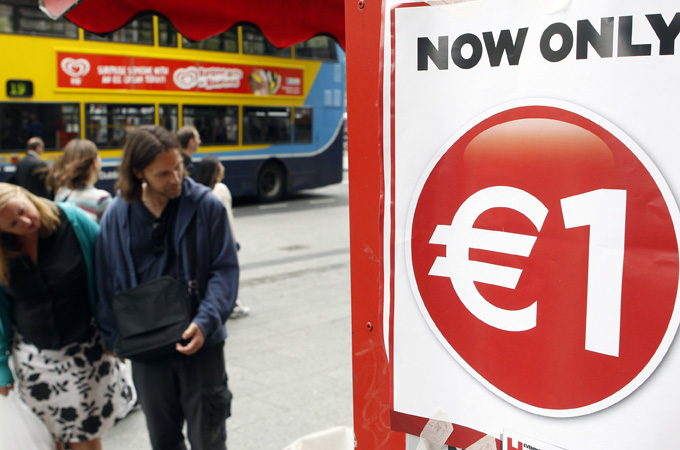Irish bond downgrade bruises eurozone
Ireland becomes latest eurozone member to see its bonds rated as junk amid concerns country will need second bailout.

 |
| European politicians accused credit rating agencies such as Moody’s of anti-European bias [Reuters] |
Credit rating agency Moody’s has downgraded Ireland’s government bond ratings to junk, dealing a further blow to the eurozone as it struggles to contain a worsening debt crisis.
Moody’s on Tuesday said it cut Ireland’s rating by one notch to “Ba1” from “Baa3” – to junk status – because it sees a growing risk the debt-ridden country will need a second bailout once its current rescue package expires at the end of 2013.
The outlook for Ireland remains “negative”, Moody’s added.
Banks and other private investors will likely be asked to contribute to any new bailout, for instance by giving Ireland more time to repay its bonds, Moody’s said.
Such private sector involvement is currently being negotiated for Greece, the first eurozone country that had to be bailed out and which now is negotiating its second rescue package within a little over a year.
Tough trend
The downgrade of Ireland follows a similar move last week, when Moody’s cut the rating of Portugal, the third victim of the eurozone’s debt crisis.
It comes at a difficult time for the 17-country currency union, which in recent days has seen the crisis threatening to engulf big countries like Spain and Italy, which are considered too big to be bailed out.
A two-day meeting of finance ministers in Brussels, which concluded earlier Tuesday, opened the door for lower interest rates and longer maturities for the rescue loans of already bailed out countries – a move that
should take some pressure off Ireland.
The ministers said they would also discuss wider powers for the eurozone’s bailout fund, such as the right to buy distressed bonds on the open market and thereby lower a country’s debt load.
However, the concessions, which remained very vague, came as ministers for the first time acknowledged that they are prepared to accept a temporary default rating for Greece as part of their efforts to get banks and
investment funds to share the burden of a second bailout.
The debate over the new Greek package has rocked markets and undermined investor confidence in other struggling countries like Ireland.
It has also pushed the European Union and other eurozone countries to attack the rating agencies, which they say are unfair in their assessments of countries that have already been saved.
The bloc has already implemented new rules for rating agencies following their failure to predict the credit crisis of 2007-08.
It is set to propose a new round of regulation in November, in which it may introduce new requirements for sovereign debt ratings, such as a longer warning period for governments, allowing them to point out flaws with the data.
The European Commission, the EU’s executive and one of the institutions overseeing Ireland’s exiting bailout, immediately came out against the downgrade.
“It contrasts very much with the recent data, which support a return to GDP growth this year, and the determined implementation of the (bailout) programme by the Irish government, which has taken strong ownership of it,” the Commission said in a statement.
Moody’s acknowledged that the Irish government has slashed its budget deficit – the EU’s largest by far last year – and met the targets set out in its programme, which on top of cuts also includes tax increases and economic reforms.
However, Moody’s warned that “implementation risks remain significant, particularly in light of the continued weakness in the Irish economy.”
Debt inspectors from the European Commission, the European Central Bank and the International Monetary Fund are currently in Dublin, checking on the implementation of the bailout programme before the next loan installment can be transferred. Their mission is set to end on Thursday.